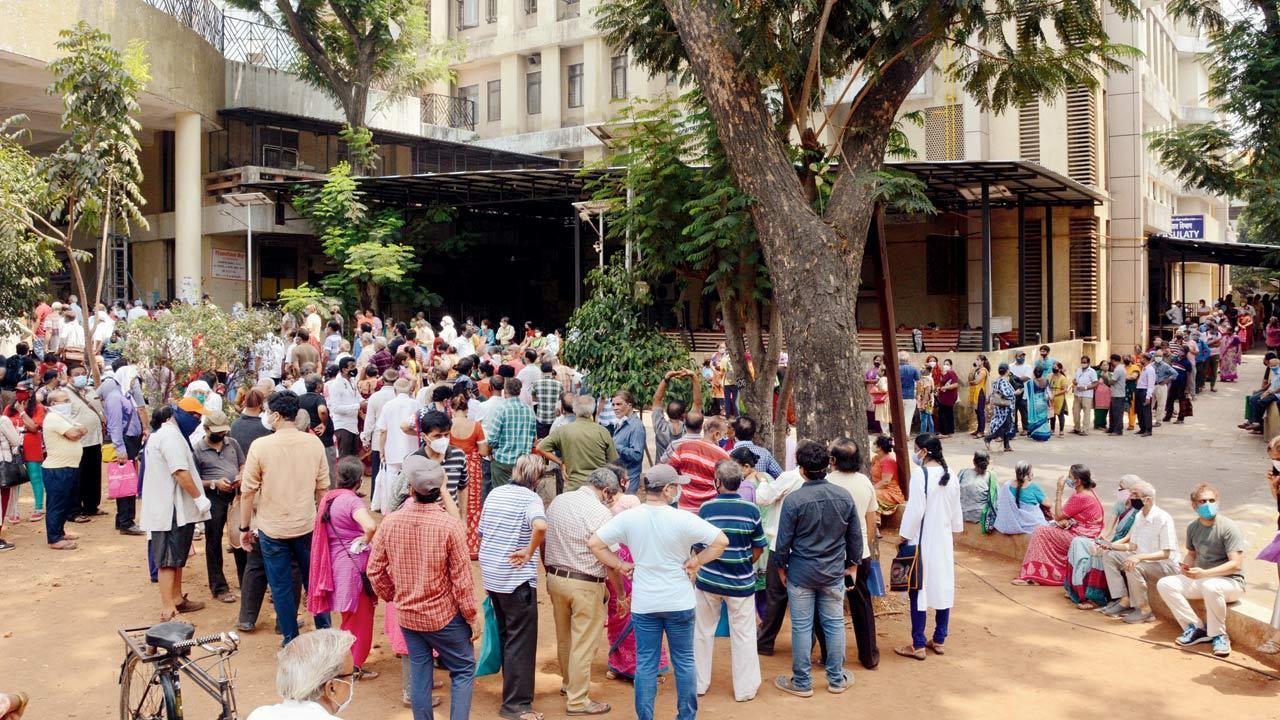Worried with current rate of inoculation, experts say nasal delivery, by August, could be solution

A large number of people wait for vaccine shots at Dr Ambedkar civic hospital in Kandivli on Monday. Pic/Satej Shinde
Hit by a tsunami of cases that has brought in unspeakable miseries for the masses, the Centre has widened the vaccination programme by including the 18+ category from May 1, instead of the original schedule of the COVID Vaccine Task Force that had planned it for July-August 2021.
The move has prompted well-known virologists and health experts to ask: are we prepared to inoculate so many people? Do we have the required infrastructure and vaccines? If not, then should states decide the timing?
Citizens wait for shots at Dr Ambedkar BMC hospital in Kandivli on Monday. Pic/Satej Shinde
Dr Subhash Hira, Professor of Global Health at the University of Washington-Seattle, said the third phase of vaccination has been announced despite Phase 2 — for those between 45 and 59 years of age — facing inadequate supplies of vaccines from the Centre to states. He said Maharashtra alone will have about 81.7 million 18+ beneficiaries. Maharashtra gets about 1.58 lakh doses a week, he explained.
“At this rate, it will take Maharashtra two years from now to cover the entire state. Even if the weekly quota is doubled, it will still take one year to complete the first round of the vaccine programme,” said Dr Hira, pointing that most states will remain vulnerable to the expanded phase of the second wave that could go past another 6-8 months and be threatened by wave-3 comprising Parkinsonism cases thereafter.
Dr Hira also expressed concerns over too many people assembling at poorly managed testing and vaccination points, stressing that these sites could be contributing to rising hospitalisations, and bed, oxygen and medicine shortage and eventually deaths. mid-day had highlighted this concern in its report of April 24. “A nasal vaccine delivery scheduled for August 2021 can be the only game-changer,” he said.
Speaking from Vellore, acclaimed virologist Dr Jacob John said, “It is high time public health experts put their head together and ask why are we vaccinating people and who should be vaccinated first? The first priority is to prevent death, and ideally whoever is at high risk of death [comorbids] or in advanced age, should be vaccinated on priority, so that their lives could be saved. This will automatically eliminate youths above 18.”
Dr John said, “Unfortunately, we have no data of our own, to rely upon. We are going by the Western nations’ data and the same cannot be made applicable in our country. For instance, if we should vaccinate pregnant women or not?” He said experts must look for answers to such questions from India’s perspective and then prioritise beneficiaries between 18 and 45. “If people in this bracket do not fall under the priority list, then full freedom should be given to the respective states.” He stressed the need for localising immunisation.
On the possibility of a third wave, Dr John added, “The new variant, which is seen in the second wave, and many more variants to come, may upset epidemiologists. All I can say is be prepared for the worst while hoping for the best.”
Dr. Wiqar Shaikh, Professor of Medicine, Grant Medical College and Sir J.J. Group of Hospitals, the 18+ population in Mumbai is about 1.24 crore and it will take way too long at the current supply to vaccinate this group. He fears the new lot overburdening the vaccine delivery staff. “Our frontline healthcare workers are already exhausted fighting COVID for more than a year now.”
Dr. Shaikh said the situation is particularly worse in rural areas that traditionally have a weak health apparatus. “In such a case, vaccination centres could become superspreaders after May 1.”
Get ready for chaos
A senior doctor at a vaccine centre, who did not wish to be identified, said they are vaccinating about 600 people a day due to shortage of shots. “When the stock is around a hundred, we collect additional stock from the headquarters. But we expect a large turnout after May 1 and it would be challenging to manage the crowd. We anticipate police presence at vaccination centres,” said the doctor. He said they are getting extra computers and printers to manage the additional formalities. “We are hiring two more data entry operators making the total strength to eight, and have roped in an additional team of doctors and nurses for the young crowd.”
The doctor added, “Many bank staffers and private agencies working under essential services are under pressure from their offices to take the vaccine, but neither the state nor the Centre has made any vaccination leave policy, making them to lose a day’s pay or take an off.”
He also pitched for separate queues — one for citizens above sixty and another for forty-five and above — and that the crowd below 45 should be made to queue up separately. The doctors then expressed his worst fear. He said, “We are hoping there would be regular supply of vaccines in large numbers or else it would become chaotic. In the given supply situation, we feel vaccination centres won’t have sufficient stock.”
1.5L
No. of doses given to state per week
81.7mn
18+ beneficiaries in Maharashtra
 Subscribe today by clicking the link and stay updated with the latest news!" Click here!
Subscribe today by clicking the link and stay updated with the latest news!" Click here!







